Disclosure Blu-ray Movie
HomeDisclosure Blu-ray Movie 
Warner Bros. | 1994 | 128 min | Rated R | Mar 06, 2012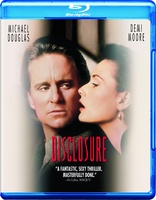
Movie rating
6.4 | / 10 |
Blu-ray rating
| Users | 4.0 | |
| Reviewer | 4.0 | |
| Overall | 4.0 |
Overview
Disclosure (1994)
An executive at a high-tech firm is passed over for a promotion, only to discover that his new boss is a woman with whom he'd had an affair 10 years earlier. When the woman immediately makes an aggressive sexual overture toward him, the man sues for sexual harassment, which uncovers a series of revelations about his own past and the future of his company.
Starring: Michael Douglas, Demi Moore, Donald Sutherland, Caroline Goodall, Roma MaffiaDirector: Barry Levinson
| Thriller | Uncertain |
| Drama | Uncertain |
Specifications
Video
Video codec: MPEG-4 AVC
Video resolution: 1080p
Aspect ratio: 2.40:1
Original aspect ratio: 2.39:1
Audio
English: DTS-HD Master Audio 5.1 (48kHz, 24-bit)
French: Dolby Digital 5.1 (640 kbps)
Spanish: Dolby Digital 5.1 (640 kbps)
Czech: Dolby Digital 2.0
French (Canada): Dolby Digital 2.0
German: Dolby Digital 2.0
Japanese: Dolby Digital 2.0
Spanish: Dolby Digital 2.0
Portuguese: Dolby Digital Mono
All 2.0/1.0 are 192 kbps / Latin Spanish=2.0 / Japanese track is hidden
Subtitles
English SDH, French, German SDH, Japanese, Portuguese, Spanish, Czech, Danish, Finnish, Norwegian, Swedish
Discs
50GB Blu-ray Disc
Single disc (1 BD)
Playback
Region free
Review
Rating summary
| Movie | 4.0 | |
| Video | 3.5 | |
| Audio | 4.0 | |
| Extras | 0.5 | |
| Overall | 4.0 |
Disclosure Blu-ray Movie Review
It’s Not About Sex, It’s About Power—REAL Power
Reviewed by Michael Reuben March 4, 2012Disclosure is best known as the film in which Demi Moore sexually harassed Michael Douglas, and much of the male audience said, "Sounds good to me!" The late Michael Crichton, who wrote the novel and co-produced the movie, had an almost infallible instinct for hot-button issues. When he published his novel in early 1994, it was just a few years after the Clarence Thomas confirmation testimony of Anita Hill created national debate over he said/she said charges. Those hearings led to amendments in the law that have made sexual harassment cases a common fixture in courts and arbitrations. Crichton styled the novel of Disclosure as a Rorschach test based on role reversal. How would the reader react to the piggish behavior typically associated with a male boss when practiced by a woman against a male subordinate? But in the hands of Barry Levinson and his frequent collaborator, screenwriter Paul Attanasio, the story eventually morphed into something else. At this point, I should warn the reader that the following discussion assumes familiarity with the story. If you proceed further, you will encounter spoilers. To avoid them, skip down to the sections on video and audio.
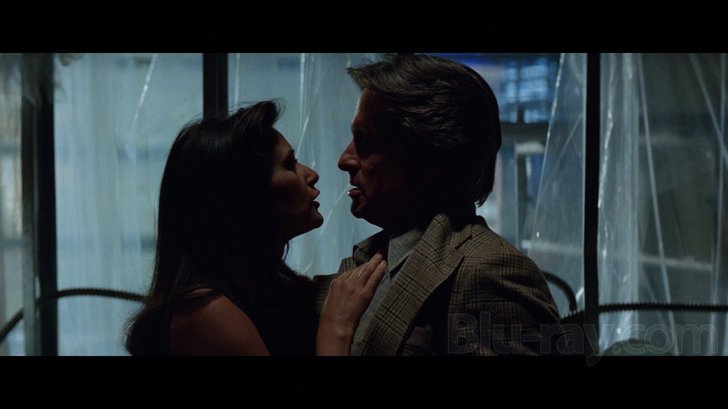
Last warning: spoilers below! Tom Sanders (Douglas) is a senior member of the production division of DigiCom, a Seattle-based high-tech company that Crichton seems to have assembled from disparate parts of various companies that dominated hi-tech in the early Nineties. (You can spot elements of Microsoft, Apple, Sun Microsystems and probably others.) On this particular Monday, Tom says goodbye to his part-time lawyer wife, Susan (Caroline Goodall), and their two kids, and heads to the office expecting to be promoted to vice president. Instead, he finds he's been passed over in favor of an outsider, Meredith Johnson (Moore), a hot shot from finance, who's the chief architect of an acquisition by a company called Conley-White Communications that will make the shareholders of DigiCom rich beyond their wildest dreams. DigiCom's oily president, Bob Garvin (Donald Sutherland), practically worships at Meredith's feet. Inconveniently enough, she also happens to be an old girlfriend of Tom's from his days as a wild-and-crazy guy. Tom breaks the bad news to his team (Nicholas Sadler, Susie Plakson and Dennis Miller, playing himself—badly). Then they all get back to work trying to figure out why the company's upcoming flagship product, Arcamax, a portable CD-ROM drive (hey, it was 1994), is rolling off the Malaysian assembly line with one defective unit after another. The Conley-White acquisition is about to be announced, and Arcamax is key to the deal. That evening, though, Meredith summons Tom to a meeting in her office and tries to seduce him. When he breaks off the encounter, she becomes enraged. The next morning, Garvin's corporate hitman, Blackburn (Dylan Baker), tells Tom that Meredith has accused him of attacking her. Blackburn suggests Tom settle quietly by volunteering to transfer to a backwater division in Austin. (As Garvin later admits, it's like asking a duck to volunteer for a transfer to à l'orange.) When Tom refuses, a deep chill settles over his work life and the dirty tricks begin. Everyone backs away from Tom, including his old friend Stephanie Kaplan (Rosemary Forsyth), the company's CFO, whom Meredith calls "the stealth bomber". Tom hires an aggressive plaintiff's lawyer, Catherine Alvarez (Roma Maffia), who's known as a publicity hound. Faced with the one thing they can't risk—adverse PR that would jeopardize the Conley-White deal—Garvin and DigiCom agree to private mediation, which allows Levinson and Attanasio to present a neatly condensed dramatization of the distortions that an adversary proceeding wreaks on the truth. Facts are used to buttress lies; pasts are dug up to be reinterpreted for ulterior motives; working relationships are destroyed, along with marriages and friendships; innocent conversations are given sinister constructions. Disclosure's proceedings may be miraculously resolved by the eleventh-hour discovery of an unlikely recording of the encounter between Tom and Meredith, but in real life, there are no such neat outcomes. One is usually left with a choice between radically conflicting stories. Throughout the proceedings, Tom keeps receiving mysterious emails from "A Friend" warning him that something else is going on, and here is where Levinson and Attanasio subtly shift Crichton's story into something more than a tract on sexual harrassment. It turns out that Meredith never really wanted Tom for his body. She just wanted an excuse to fire him so that she'd have someone to blame when, after the acquisition, Arcamax turned out to be a disaster. Hints are dropped throughout the film, but it's only near the end that Tom learns how Meredith made DigiCom an attractive candidate for acquisition. She'd slashed costs to dress up the balance sheet, and one of the key areas was the Malaysian plant where Arcamax is manufactured. As a result of the cuts, the product no longer performed to spec, but who cares as long as the deal goes through? Just blame the problems on someone who's no longer there. Meredith's shenanigans (the financial ones, not the sexual ones) are a bull's-eye parody of the tactics employed by Eighties corporate raiders and leveraged buyout specialists, and it's appropriately ironic that the actor best known for playing Gordon Gekko should here portray the victim of a woman who could have been one of Gekko's lieutenants. "I'm only playing the game the way you guys set it up", Meredith tells Tom, after all has been revealed—and she isn't just talking about sex.
Disclosure Blu-ray Movie, Video Quality 
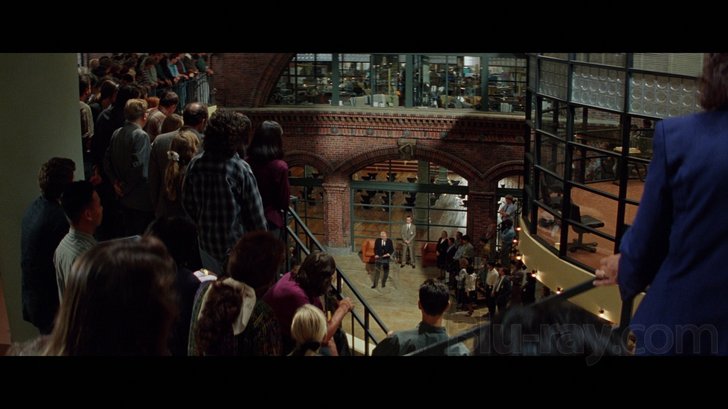
The image on Warner's 1080p, AVC-encoded Blu-ray of Disclosure is something of a mixed bag. The colors, black levels and contrast range appear to accurately reproduce Tony Pierce-Robert's (Underworld) cinematography, which gives Seattle a picturesque haze and finds all the intriguing angles in the elaborate set built to represent DigiCom's Seattle office. Fleshtones often appear somewhat pinkish, but my recollection is that Disclosure has always looked that way. The film's grain appears to be natural and undisturbed by inappropriate digital manipulation such as high frequency filtering or artificial sharpening. The use of a BD-50, along with an absence of extras, has allowed the image to "breathe", ensuring a lack of compression artifacts. The disappointment is an intermittent lack of sharpness, especially in distant objects and faces in longer shots. While it is always possible that such softness is inherent in the source material, that was not a typical characteristic of films of the period, and I don't remember being struck by it when the film was in theaters. Nor is filtering or softening of the image noticeable in close-ups, where the image is just as likely to be sharp and detailed. Since Disclosure was shot with anamorphic lenses and utilized the entire expanse of the 35mm frame, there should be no loss of detail due to blow-ups or extractions. I can't explain the indistinctness; I can only report it.
Disclosure Blu-ray Movie, Audio Quality 
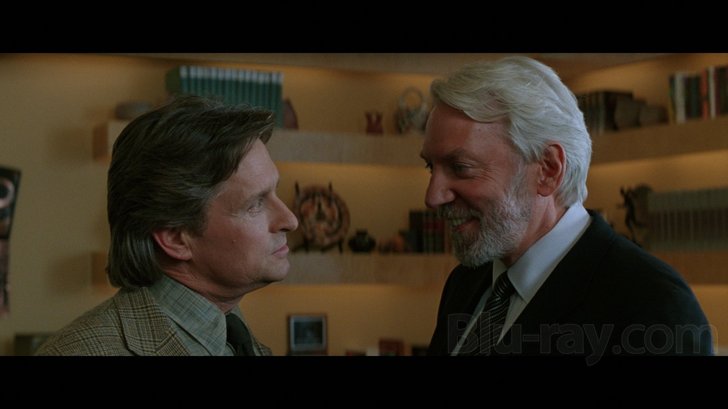
The highlight of Disclosure's DTS-HD MA 5.1 tracks is Tom Sanders' journey into the virtual reality environment known as "The Corridor", which is the only way he can inspect the company's files after his privileges are revoked. An ILM creation, The Corridor may not look like much by today's gaming standard, but it sounds fantastic, as the film's mixers take advantage of its artificial world to surround the viewer with voices, echoes, footfalls and a kind of nightmare parody of the paranoid office environment in which Tom has been operating since his encounter with Meredith. One of the most interesting editorial choices in the film is to maintain this sonic environment even as the scene shifts to the evil Meredith back at DigiCom, as she sits down to her computer to begin erasing evidence of her misdeeds. At this point, there's no real difference between the real Meredith and the spooky avatar Tom will shortly encounter in VR. They're both cold-blooded, and they're both his enemy. Nothing else on the track offers the same opportunity for dramatically enveloping sound, though the mixers do take advantage of what was still, in 1994, the relatively new format of discrete 5.1 surround. In the opening sequence, seagulls and ferry horns are heard in the rear channels, and the scenes at DigiCom's office have a nice environmental ambiance. Ennio Morricone's urgently understated score, which, as always with Morricone, suits the action perfectly, weaves in and out of the action with beautiful tonality. I'd forgotten just how good it is. Dialogue is clear and, in the best scenes, intense.
Disclosure Blu-ray Movie, Special Features and Extras 
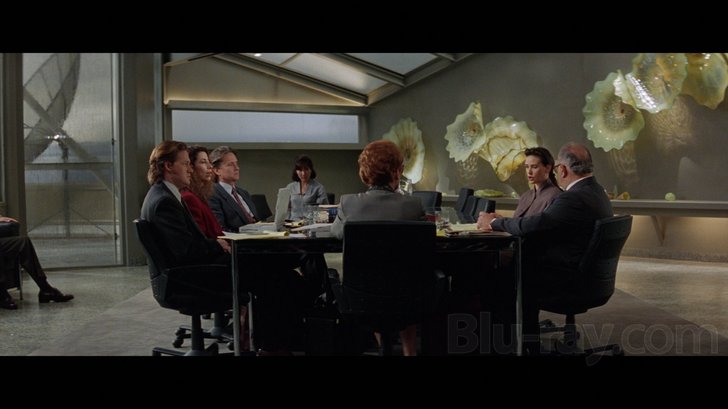
- Theatrical Trailer (SD; 1.33:1; 1:56): If memory serves, there were several different trailers. This is one of the tamer versions.
Disclosure Blu-ray Movie, Overall Score and Recommendation 
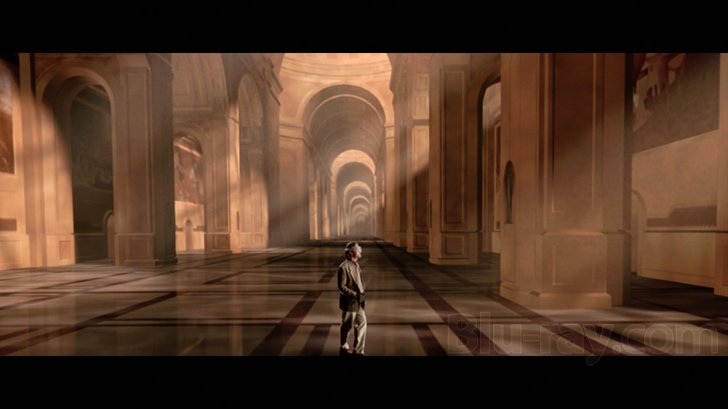
Near the end of Disclosure, after Tom has vanquished Meredith, he goes to her soon-to-be-vacated office to pick up some files. He finds her there packing, where she brags about the headhunters calling her with offers. "Don't be surprised", she says, "if I'm back in ten years to buy this place". With the passage of time, we know exactly where someone of Meredith's talents and temperament will be in ten years. The tech boom and the dot.com bust would have made any interest in DigiCom irrelevant (assuming the company still existed). By 2004, a finance whiz like Meredith would have moved where the real action was: on Wall Street, bundling mortgage and consumer debt into bonds (otherwise known as "derivatives") and selling them to willing buyers with deceptively high ratings from compliant ratings agencies. Within a few years, she'd have mastered the lingo of credit default swaps, and if she were nimble enough, she'd either get out just in time in 2007, or position herself to be indispensable when the bailout came in 2008. "I thought we were buying this company because they could build things", says the head of Conley-White. How quaint that seems now. Highly recommended as a film, but see above regarding the Blu-ray image.
Similar titles
Similar titles you might also like

Zipper
2015

Miss Sloane
2016

Madame X
1966

Wild Things
Unrated Edition
1998

Tom Clancy's Jack Ryan: The Complete Series
2018-2023

Good Kill
2014

A Most Wanted Man
2014

The Postman Always Rings Twice
1981

Criminal Law
1988

The Life of David Gale
2003

Rust Creek
2019

Michael Clayton
2007

Secret Honor
1984

The Company You Keep
2012

Syriana
2005

Changing Lanes 4K
2002

The Whole Truth
2016

The Little Drummer Girl
Warner Archive Collection
1984

House of Cards Trilogy
House of Cards / To Play the King / The Final Cut
1990-1995

Shadow Dancer
2012